Premier makes a four-point proposal for closer China-ASEAN ties
Chinese Premier Li Qiang said at the 26th China-ASEAN Summit in Jakarta, Indonesia Wednesday that as long as China and ASEAN countries keep to the right path, whatever storms may come, their cooperation will be as firm as ever and they can press ahead against all odds, and analysts said that China-ASEAN ties remain close and will continue to develop to withstand the impacts of any external interference that attempts to instigate tensions and conflicts.
Li said that China-ASEAN cooperation has come a long way thanks to their keen understanding about hardships. “China and ASEAN countries have been committed to the unwavering pursuit of peace with a strong aspiration for development, and both take real actions to safeguard regional stability,” he said at the summit, the Xinhua News Agency reported on Wednesday.
The Chinese premier also said that China and ASEAN countries have properly handled disagreements by seeking common ground while shelving differences through dialogue and consultation.
“The two sides have been deepening practical cooperation in the traditional and non-traditional security fields, and have upheld the five principles of peaceful co-existence and the purpose of the TAC (Treaty of Amity and Cooperation in Southeast Asia),” Li remarked.
Xu Liping, director of the Center for Southeast Asian Studies at the Chinese Academy of Social Sciences, told the Global Times on Wednesday that “facing rising turbulence among the international community and the challenge of reverse globalization, China continues its attendance at the multilateral event held by ASEAN and chaired by Indonesia, where it presents China’s solutions to global challenges with sincerity despite interruptions brought by external forces. These have shaped an image of China as a responsible major power.”
The US is making great efforts to use disputes among regional countries on the South China Sea issue to instigate new tensions, interrupting the stability and development of the region to ruin the process of negotiation, experts said. These acts are not welcomed by the majority of ASEAN members, and with more pragmatic cooperation and dialogues with China, ASEAN is able to maintain peace and stability for the region to withstand external interruptions, they noted.
For ASEAN, the key is to see whether China or the US is sincere in its support of ASEAN’s centrality in the region, Xu said. “While it openly expresses support, the US’ actions show its duplicity. The Biden administration is trying to promote its Indo-Pacific strategy over and over again. It wants to force ASEAN members to join its small clique and to have unnecessary but dangerous tensions with China while offering no meaningful support to boost regional integration or economic development. It is only interested in costly security cooperation. This in fact weakens ASEAN’s centrality and shows that the US’ purpose is different from what ASEAN wants,” Xu noted.
China has proven its respect and support for ASEAN by actions and notable cooperation projects like high-speed rail construction. China has always insisted on seeking solutions to disputes via diplomacy with relevant countries in the region, and China has never established any new multilateral platforms in the region to weaken the ASEAN’s position. ASEAN members are crystal clear about these differences between China and the US, experts said.
Premier Li took a test ride Wednesday on Southeast Asia’s first high-speed railway, the Jakarta-Bandung High-Speed Railway, which connects two Indonesian cities as part of China-proposed Belt and Road Initiative, media reported.
ASEAN’s wisdom
According to Indonesian media TEMPO, Indonesian President Joko Widodo hailed the importance of China-ASEAN mutual trust as he opened the summit on Wednesday. He stressed the need for ASEAN and China to realize concrete cooperation that is mutually profitable. “This can only be done if we have trust in each other, which of course needs to be developed and maintained by all parties,” Jokowi said at the Jakarta Convention Center on Wednesday.
On Tuesday, at the 43rd ASEAN Summit, Widodo stated that ASEAN would continue to uphold equality. As the world faces all kinds of issues, greater challenges will come, and there will be things leading to a tussle for influence by the superpowers. “ASEAN has agreed not to become a proxy for any power,” Jokowi said, TEMPO reported.
Chinese analysts said as a major power in ASEAN, Indonesia realizes that with the rising tensions caused by the US-launched containment against China, as well as the tensions between the West and Russia over the Ukraine crisis, ASEAN is facing a danger of becoming an arena for confrontation between great powers.
Marzuki Alie, former speaker of the House of Representatives of the Republic of Indonesia, told the Global Times in an exclusive interview that “The relationship between China and the United States has a very complex and growing effect on Southeast Asian conditions. To attain stability and prosperity in Southeast Asia, it is essential that countries in the region maintain a balance and establish mutually beneficial relations with the two countries, as well as promote constructive dialogue and cooperation to achieve stability and prosperity in Southeast Asia.”
“In some respects, China’s contribution to ASEAN is greater than that of other nations, including the United States,” Marzuki said.
Wirun Phichaiwongphakdee, director of the Thailand-China Research Center of the Belt and Road Initiative and researcher at the Thailand-China Strategic Research Center at the National Research Institute of Thailand, told the Global Times that “It seems like some Western countries have gone to great lengths to maintain their hegemonic position on the global stage, even at the cost of instigating divisions and even conflicts.”
“But what ASEAN economies and other parts of the world need are cooperation and development, which are incorporated in the concepts and initiatives China has put forward. We welcome competition, but not in the form of veering into confrontation,” said the Thai expert.
“China is not only the creator of mutually beneficial concepts, but also a true propeller of regional development, which are in stark contrast to some countries’ empty promises. I would suggest that some countries not interfere and create chatter while interfering in China-ASEAN cooperation, because we know what is best for us,” Wirun said.
Singaporean Prime Minister Lee Hsien Loong said at the ASEAN-China summit on Wednesday that the US and China need to “show leadership” to address a range of global issues, making it crucial for both to continue dialogue, build strategic trust at all levels and strive for greater cooperation, according to the CNA.
When the US only interested in containing China’s development by all means to preserve its hegemony, it is impossible for the two biggest economies to “show leadership” together, even though China has always urged the US not to be driven by a cold war mentality, to cease its hostile containment strategy against China, and has called for cooperation to find a solution for global challenges, experts noted. On this matter, China shares a consensus with the majority of the international community, and the key is for the rest of the world to convince the US to change its mind, experts said.
Economic growth center
In his speech, Li outlined the Chinese economic situation with the ASEAN members and other Asian countries. According to Xinhua, Li said in his opening remarks at the 26th ASEAN Plus Three Summit that the “Chinese economy is on track to realize the annual growth target of around 5 percent.” China is advancing high-quality development in Chinese modernization on all fronts. The Chinese economy enjoys bright prospects, and will continue to generate fresh and greater opportunities for the region and the rest of the world, he remarked.
Li stressed that the ASEAN Plus Three countries, and indeed all countries in Asia, share so many things in common. They share a common home, common interests and common opportunities, Li said at the 26th ASEAN Plus Three Summit.
Li made a four-point proposal for fostering a closer China-ASEAN community with a shared future, the first of which is that China and ASEAN should work together to build an economic growth center, enhance interconnectivity, and deepen cooperation in industrial and supply chains.
Both sides should also jointly promote cooperation in emerging industries, and strengthen collaboration in such fields as new energy vehicles, photovoltaics and artificial intelligence, Li said.
Li Haidong, a professor at the Institute of International Relations at the China Foreign Affairs University, told the Global Times on Wednesday that “the premier’s remarks sent a strong signal to counter the recent narratives among Western media and politicians that have badmouthed China’s economy. He delivers confidence to the region about not only China’s economic growth, but also the joint growth that will benefit all countries in Asia.”
“According to some data released by the US, it might be able to realize 2 to 3 percent annual growth, and if we take the US national debt into account, the US can only realize an annual growth of 0.2 to 0.3 percent at the most. Based on these facts, China, with a 5 percent annual growth, is still growing faster than the US, and with more potential,” Li Haidong noted.
By badmouthing China’s economy, the US is trying to spread fear and concern about a potential crisis in Asia, to drive talents and money away from the region and move to the US, so when US leaders and media talk about the economy, they do not care about benefiting everyone, but try to ruin the growth of others and use the crisis for their own benefit, Li Haidong said. “This is what the US is really good at, and it has tried many times in the past.”
This is why China is encouraging ASEAN, as well as the whole of Asia, to remain confident and work together to build an economic growth center with strong certainty amid a world in turbulence, experts said.
During the summit, a joint statement was issued on mutually beneficial cooperation between the Belt and Road Initiative and the ASEAN Outlook on the Indo-Pacific, and a series of outcome documents were adopted, including a joint statement on deepening agricultural cooperation between China and ASEAN, an action plan on China-ASEAN green agricultural development (2023-2027), an initiative on enhancing bilateral e-commerce cooperation, and an initiative on jointly implementing China-ASEAN science and technology innovation enhancement program.
The summit also welcomed the signing of an agreement on China-ASEAN technical cooperation and announced the year of 2024 as the China-ASEAN year of people-to-people exchanges.
(Global Times)




